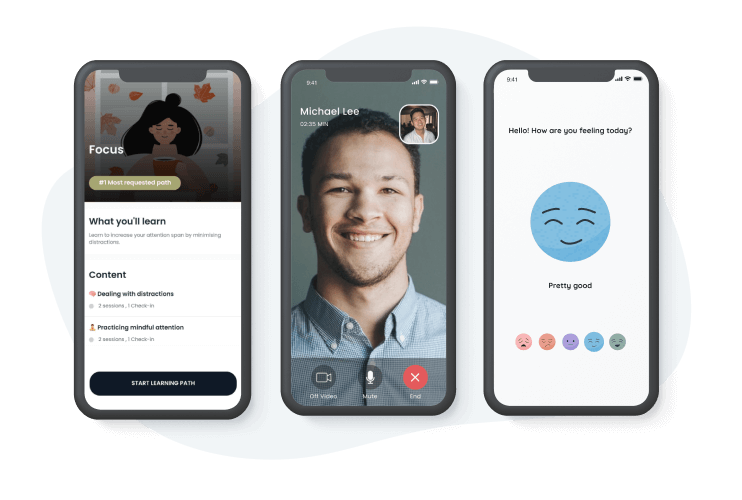Picture this: you’re struggling to manage your team members amid curveballs like burnout, resignations, and absenteeism. You’ve tried everything to boost their morale and retain your employees, but nothing seems to be working. Coaching could be what you need to set your company in motion.
Contrary to popular belief, coaching isn’t just for top executives and managers. It benefits all employees renewing their drive. Despite that, coaching hasn’t caught on in the Asian corporate world. Only 5% of the world’s coaching happens in Asia, although more than half of the world’s working population is based here.
What is coaching?
Behavioural coaching is not counselling or therapy. While the latter focuses on changing thoughts, behaviours, and emotions, coaching is an avenue to explore opportunities, create an action plan for improvement, and be held accountable for it. That is not to say that coaching is reserved for professional development. Rather, coaching is a solution-focused tool that also applies to personal wellness.
Employees at all levels can gain from coaching, regardless of their performance. Motivated employees and high-flyers can benefit from coaching just as much as someone who is struggling. Coaching provides that extra “push” – a laser focus on your goals and a spur of momentum to get you there.
Benefits of coaching
Behavioural coaching has been hailed as a cornerstone of employee engagement. According to Forbes, it boosts retention rates, inspires executives, and optimises business performance. There’s a good reason for this: behavioural coaching gets to the heart of what makes your people tick, meets them there, and inspires them to align their career goals with personal beliefs and values.
Behavioural coaching also equips managers with the skills to engage team members and guide them towards a common objective. Importantly, it shows employees that their contributions are valued. They aren’t simply a cog in the machine.

Before walking into your first coaching session, whether you are a company leader or employee, it’s prudent to prepare a list of questions you may have for your coach. This can be anything from their level of experience to their methods for helping you achieve success at work.
Coaching outcomes for managers and executives
Coaching provides managers and executives with an opportunity to reflect, evaluate, and brainstorm away from the everyday stresses of the office. Since they have the greatest impact on an organisation’s culture, processes, and strategies, supporting company leaders goes a long way.
Create psychological safety
Middle managers have to toe the line between being authoritative and approachable while contending with their duties. Employees should feel safe about coming to you with problems, but not so comfortable that they lose sight of the objectives. Resolving conflicts and addressing underperformance are unavoidable, but a coaching mindset is what separates managers from leaders.
In the spirit of inclusion, a coaching mindset prizes collaborative problem-solving over having the manager take the helm. Giving team members a voice makes them feel seen and heard, which in turn encourages them to share thoughts and ideas without fear of judgment.
Prevent burnout
Are individuals or companies responsible for preventing burnout? While managers are no substitutes for counsellors, they’re seen as the first line of defence against employee burnout. Reaching out to team members in distress can make a world of difference, but how to start?
Coaching can help. By catching the signs from a mile away, managers can intervene before their flame goes out altogether. This looks like aligning an employee’s work with their strengths, goals, and purpose, whilst helping them establish boundaries that promote work-life balance.
Reach out to team members
Mental health is a sensitive topic, and managers don’t always know how to broach it. Coaches, who are no strangers to such conversations, have much to offer in this department. The first step, according to Intellect’s executive coach Robyn Cam, is to determine if intervention is needed at all.
After your assessment, don’t jump into a one on one just yet. Instead, pick a good timing and location, and be mindful of your verbal and non-verbal cues. Intellect’s clinical team has a 3-step framework that managers can familiarise themselves with ahead of time, or practise in coaching for the best outcome possible.

Cut back on micromanagement
Managers approaching work with a coaching mindset are also better delegators. They have the skills to define a task, create an appropriate timeline, and avoid micromanagement. A coaching mindset allows team leaders to recognise contributions from each team member, ensuring that everyone has ownership of the business outcomes.
When problems arise, Intellect’s five-step coaching plan is a great template to empower employees and lead sustainably. Rather than stepping in to “save the day”, this framework lets employees take the reins and feel more confident about tackling similar issues down the road.
Engage remote employees
Coaching remote employees is a whole different ball game that calls for an updated modus operandi. It could be removing distractions before a video call, and getting urgent matters out of the way in the first couple of minutes. Importantly, find a coaching model that suits you and assures employees of the session’s confidentiality.
In their own coaching sessions, managers and executives could also think up high-level ways to better remote company cultures. From access to on-demand workspaces to peer recognition budgets, they can take a cue from other companies’ playbooks in ideation.
Overcome imposter syndrome
New managers sometimes suffer from imposter syndrome—feeling like they are not worthy of their titles or that they are “faking it” at their job. Gartner’s research shows that nearly half of employees promoted within their organisations end up underperforming after a year and a half.
High-flyers are not spared, but even new company directors have benefited from coaching. Imposter syndrome may be attributed to perfectionism and self-comparison and can be managed by changing the way we think, talk to ourselves, and define “success”. Coaching does just that by providing timely intervention so new managers may avoid pitfalls down the line.
Give feedback effectively
Assessing your subordinates may be simple, but delivering feedback in a helpful and empathetic manner takes practice. The performance appraisal season can be stressful, which makes a review template handy, especially for new managers.
Giving feedback is more than detailing an individual’s strengths and weaknesses. According to Intellect’s executive coach, managers are better off focusing on behaviours instead of personal traits and citing specific examples. Phrasing feedback with fairness, honesty, and compassion is an art, and a little practice in coaching will pay off.
Coaching outcomes for employees
Now that we’ve covered the benefits of coaching for leadership roles, let’s take a look at how it can benefit the rest of the team.

Prepare for an appraisal
Performance reviews can be nerve-wracking, but coaching can help employees view them as constructive conversations. By completing a self-reflection template beforehand, for starters, employees demonstrate a growth mindset and commitment to improvement. On the contrary, those who go into an appraisal feeling stressed end up being more reactive.
Depending on how it went, appraisals can leave employees inspired or disheartened. In the latter case, coaches serve as a neutral sounding board for employees to process their thoughts and feelings.
Communicate assertively
Conversations with higher-ups can be tricky, no thanks to differences in culture, work priorities, and communication styles. If you tend to communicate passively or passive-aggressively, Intellect’s behavioural health coach has a tip for you.
The DEAR MAN GIVE FAST framework, which is rooted in Dialectical Behavioural Therapy, helps individuals to get their messages across while maintaining interpersonal effectiveness. It’s a delicate balancing act, but one that employees can perfect in coaching. That said, it’s no magic bullet. If all else fails, coaches could introduce new ways, like the practice of radical acceptance, of coping.
Working with micromanagers
Managing up, especially when dealing with micromanagers, is a skill we should’ve been taught in school. Fortunately, coaching offers answers employees can’t possibly find at the workplace.
If you report to a “helicopter” boss, this 3-step guide by Intellect’s behavioural coach Yogini Shiva offers a glimpse of what you might glean from a session. It starts with giving them the benefit of doubt and addressing their behaviour in an empathic manner. Critically, you will learn how to propose win-win outcomes, negotiate, and prove yourself over time. Or, you could discover that you, too, have micromanagement tendencies and walk away with a lesson on self-awareness.
Navigate burnout
A study found that most workers who went on vacation did not come back any happier than when they left. If burnout persists even after a long break, the root cause could be deeper than it seems.
If you’re having doubts about your job, chances are, your manager is the last person you’d tell. A coach, whose interest does not conflict with the company’s, makes a far better outlet to talk things through. Intellect’s behavioural health coach Julie Samuel, for example, has helped her clients with work-life balance, introspection, and proposals that they eventually table with managers to achieve desired outcomes.
Intellect: An end-to-end solution

The pandemic has been tough on everyone. Generic employee assistance programmes won’t get to the heart of what they need, but personalised support might. Intellect takes employee wellbeing out of managers’ hands and gives employees agency to develop personally and professionally on their terms and at their pace.
Looking to replicate our clients’ success with an end-to-end solution? Intellect can help.








